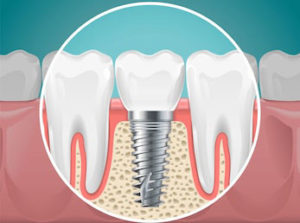Implant-supported dentures San Diego

When a patient loses a tooth, they nearly always prefer a dental implant for the replacement. However, if a patient has lost many teeth or even all of the teeth, they may be uncertain about whether dental implants are an option for them. Can a dentist place enough dental implants to replace all of the teeth?
Implant-supported dentures
Fortunately for those who are missing many or all of their teeth, it’s not necessary to place a separate dental implant for each missing tooth. Instead of replacing each tooth with a separate crown, the teeth can be replaced with a full denture, which is anchored into the jaw by a few dental implants.
A full denture can be supported on as few as 4 implants (for the lower jaw). This is why implant-supported dentures are sometimes referred to as “all-on-4,” because all of the replacement teeth are supported on just four dental implants. The denture can be removed for cleaning, and worn securely all day on the implants.
How many implants is enough?
It’s important to note that four implants is the minimum number required to provide good support for a full denture in the lower jaw. However, some patients may need more, depending on the thickness and health of their jaw bone tissue. To ensure long-term stability of the implants, many dentists prefer to place an additional implant or two even in those with plenty of healthy bone tissue. This reduces the amount of force placed on each implant during chewing, to help it stay well-integrated into the jaw for years to come.
The upper jaw is thinner than the lower jaw, due to the presence of the sinuses above it. This means that each dental implant must be shorter in the upper jaw. Because of that, more implants are needed to support a full denture in the upper jaw than in the lower. Six is the minimum number of implants required in the upper jaw; again, some patients may need more, and many dentists prefer to place more than the minimum number to help ensure long-term success of the procedure.
A partial denture can also be supported on one or more implants, depending on the size of the denture and other individual factors. If you need a partial denture, your dentist will discuss with you how many implants would be needed to support it securely.
What are the advantages of implant-supported dentures?
For those who have lost all of their teeth, wearing removable full dentures is also an option. Patients may prefer implant-supported dentures for several reasons. One is stability. The implants anchor the denture into the jaw bone, and once healing is complete, the patient can eat or drink whatever they like without worrying about their denture slipping out of place.
Another big advantage of supporting the denture with implants is the preservation of bone tissue in the jaw. Once the support of the tooth roots has been lost, the body begins to reabsorb the tissue of the bone. This causes collapse in the structure of the face over time, and it also affects the fit of the dentures, generally requiring them to be refitted more than once as the bone shape changes. By contrast, implants integrate into the bone and provide a stimulus much like that of a natural tooth root, so that the tissue of the jaw bone is maintained.
Are you considering implant-supported dentures San Diego?
Implant-supported dentures can help those who have lost many or all of their teeth, allowing them to eat and drink without worrying about slipping dentures, restore confidence in their appearance, and maintain bone structure. You also have other options for replacing missing teeth. In order to decide what’s best for you, you will need personalized advice from a professional.